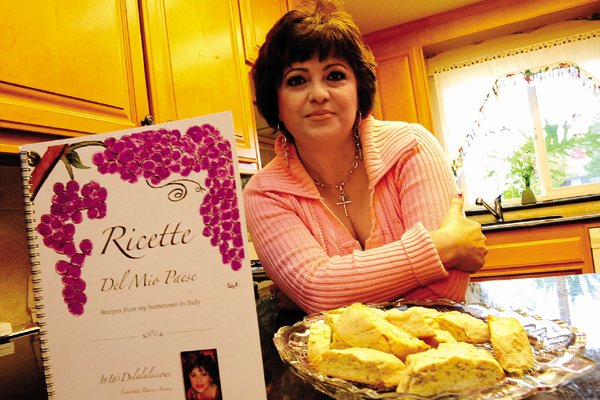Lauretta Barsi-Avina lived in Italy until she was 8 years old,
when her family moved to the United States and settled in
Gilroy.
Now living in Hollister, she has fond memories of the cuisine
she ate in her native Marlia, Tuscany.
Lauretta Barsi-Avina lived in Italy until she was 8 years old, when her family moved to the United States and settled in Gilroy.
Now living in Hollister, she has fond memories of the cuisine she ate in her native Marlia, Tuscany.
In recent months, she collected some of her favorite recipes and the stories behind them into a cook book called “Ricette Del Mio Paese,” which is available in Gilroy at Garlic World and Fortino Winery and at San Juan Bautista’s Dona Esther Mexican Restaurant.
The book translates to “My Country’s Recipes,” was printed by Barsi-Avina at a print shop, collated and bound by herself at home and sells for $15.
The money she makes from the profits will be split between a scholarship fund in memory of her sister Franca Barsi – who died in 2006, a victim of domestic violence – and Barsi-Avina’s own studies. She is taking online classes toward a degree in criminal justice to be a victim and witness advocate, inspired by her family’s own experience with the justice system.
“When something like this happens, no one really understands it,” Barsi-Avina said. “It is so tragic. No one understands how you wake up one day and life is changed.”
She said she and her family spent a year going in and out of court while the suspect in her sister’s case, David Vincent Reyes, was on trial. Reyes was eventually sentenced to 32 years in prison for pleading guilty to voluntary manslaughter, two counts of felony robbery and failure to register as a sex offender.
“We’d never been to court,” Barsi-Avina said. “As a victim, it is so stressful to see the amount of effort it takes to convict someone. He already confessed … But the whole experience made me feel inspired to go back to school to be a victim advocate.”
Shortly after her sister’s death, Barsi-Avina said she and her mother thought of starting a scholarship in Franca’s memory. Since both daughters had been crowned Gilroy Garlic Festival Queen, the two contacted officials to see if they could coordinate with them.
“They send a copy of the applications along with transcripts and we read all of them and go over them,” she said. “We are looking for someone who wants to make something of themselves and is willing to work for it.”
Each year, the family selects one student to receive the scholarship. Last year’s recipient, a student at Gavilan College, received $900.
While the cook book dredged up some bad memories of losing her sister, it also brought up plenty of good memories of dinner with family and friends – in Italy and locally.
“We literally sit down for three or four hours for multiple courses,” she said.
The meals include antipasto, different pasta sauces, homemade gnocchi, meat dishes and they always end with biscotti dipped in a white or dessert wine.
Barsi-Avina’s mother caters a little on the side, and Barsi-Avina has friends who pay her to make the family’s signature biscotti cookies. She would often use the money made from baking toward the scholarship fund. It was friends who suggested she should put together a cook book and use the money for the scholarship, as well as her own studies.
With the help of friends and family, she put together the book, which includes more than a dozen family favorites. Some are regional recipes, such as a lasagna that uses besciamella – a creamy white sauce – instead of ricotta cheese. Others are recipes that are Barsi specialties, such as the involtini di carne, which are rolled pieces of beef stuffed with different fillings.
“Everyone helped me tie it together,” she said. “It took two months. There were a lot of sleepless nights.”
In the book, she writes about growing up in Italy and her favorite meal when she would come home from school. She wrote about the Gilroy Garlic Festival Queen pageant, when she talked about a family recipe when asked by the judges about her favorite garlic dish. She also wrote about her sister, Franca, and other family members.
“When I first moved here in 1972, it was hard being different,” she said. “I wanted to assimilate … as I grew up I became proud of it.”













